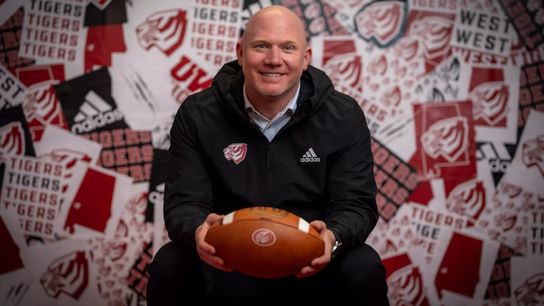Like countless others before him, Scott Cochran didn't think it could happen to him.
He was the head strength coach, hand picked by Nick Saban at Alabama, being featured on ESPN and pumping up a packed Bryant Denny stadium for a perennial national title favorite on the JumboTron, and a FootballScoop Strength Coach of the Year selection...surely he couldn't get addicted to something.
As we now know, thanks to the courage of Cochran to share his testimony, that's exactly what happened.
A new documentary from AL.com got Cochran to go in-depth on his story of addiction with painkillers, and he details just how deep his battle ran in the new Iron Docs feature.
As Cochran lays out in the gripping 30-minute video, it started with headaches around 2009 that were brought on from his intensity and yelling that go along with his role working with at least five groups of guys in the weight room a day. He explored a variety of options to deal with the headaches, that were gradually getting worse, and what started as the occasional head dip in the cold tub, or Tiger Balm on the temples for some temporary relief from the pain turned into a trip to the doctor where he was prescribed painkillers for the first time.
Before writing the prescription for Oxycodone, the doctor warned Cochran that he really didn't want to write the script because of its addictive qualities. Cochran told himself that happens to folks like the homeless sleeping under bridges, not guys like him.
By 2015, Cochran says he was "in deep." He was hooked to the point he was snorting pills. The headaches were gone and he was able to coach the way he wanted to.
But issues arose when the initial doctor that had prescribed the painkillers wouldn't write anymore. So he found another doctor in-state that would get him 90 pills per month. Then he needed more, so he found a doctor in Mississippi as well. Then he had two doctors prescribing 90 pills per month.
In 2017, Cochran realized he had a problem on his hands. His habit was not only getting expensive, he also found himself hiding at times, was hating who he had become and was battling with feelings that he was a fraud despite helping Alabama reach the pinnacle of college football.
That's when Cochran shares that he tried to "outrun the disease" by taking the special teams coordinator job with Kirby Smart at Georgia. He thought the chance in scenery and being in a new environment would help him kick the addiction he had developed, but the withdrawals were too intense. He picked right back up where he had left off in Tuscaloosa.
Then COVID hit, and Cochran returned to his family in Tuscaloosa to get his house ready to sell to make the move to Athens. On an April day in 2020, while on a Zoom call, Cochran's wife went to leave the house and thought it was odd that she hadn't heard Scott's voice, so she went to check on him and found him face down on the floor. She called 911, and medical personnel arrived and administered Narcan to bring Cochran back.
On Easter Sunday, Cochran entered a rehab facility in Massachusetts without telling anyone, and spent the next 30 days there. Cochran admits he lasted two months before slipping back into the grip of addiction - this time he wasn't taking it because he needed it because of his headaches, and he fully realized he was an addict. Fentanyl eventually took the place of the pressed-pill painkillers.
That led to rehab stints in 2021, and in 2023 Cochran came to the realization - with some help from his wife - that he needed help again, and that is what true toughness looks like, Cochran explains.
In a moment that will give everyone watching chills, Cochran tells of addiction that "my disease takes hostages, and the hostages that were taken all live under my roof. My kids all paid the ultimate price, and my wife did too."
See the full documentary for the first-year West Georgia (D-II) head coach in the clip. Hats off to AL.com on this one, they really did an outstanding job.
